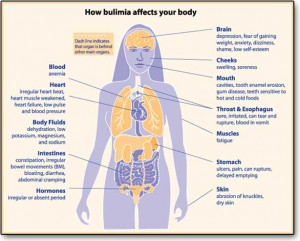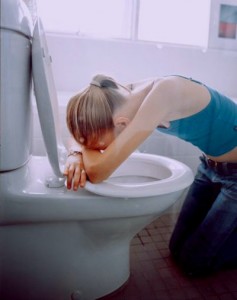Bulimia nervosa is a physical disorder which may even turn life- threatening. This condition is categorized as a fatal eating disorder. The common traits of this eating disorder is binge eating and purging, which means that the affected individual eats food in excessive amount just to expel it away after few minutes. This they do in order to abolish the excessive calories which they think they consumed through the meal. The individuals suffering from this eating disorder may also adopt other unhealthy ways to get rid of their calories. A patient may also do excessive exercise to get rid of these excessive calories along with self- induced vomiting.
If a person suffers from bulimia nervosa he probably becomes obsessed with her/ his weight as well as body structure. Such an individual may take measures to overcome the physical flaws related to the appearance. It should be known that this condition is not attributed to the taste of food or diet but it is mainly associated with personal image; this makes it difficult to be treated. However, there are effective treatments of this eating disorder that may help the patient perceive that his image is ideal or at least appropriate. This may also cause the patient to adopt good eating habit and reverse the affects of this type of eating disorder.
Symptoms of Bulimia nervosa:
There are certain visible symptoms of bulimia nervosa. These symptoms may be both physical as well as psychological. Some of the possible symptoms may include:
• A feeling of uncontrollable eating habit
• Binge eating or eating until one feels uncomfortable or unbearably stuffed
• Eating excessively during binge mealtime as compared to food consumed during normal meal time
• Self induced barfing after binge eating due to guilt of over satiation
• Performing excessive workout or exercises
• Use of laxatives or diuretics to evacuate eaten food
• Being too obsessed with body structure as well as overweight
• Having badly shaped or very skinny body and significantly lower weight
• Visiting toilet soon after consuming food or even during the meal
• Abnormal or malfunctioned bowel
• Inappropriate dental health such as damaged teeth and unhealthy gum
• Protrusion of salivary gland
• Soreness of mouth or sore throat
• Dehydrated body
• Unusual heartbeats
• Calluses or hard skin on hands particularly near knuckles
• Amenorrhea or menstrual issues in case of women
• State of depression
• Anxiousness or nervousness
Sometimes a person with bulimia nervous may also purge out the food even after consuming small amount of snack or normal meal. A person may also continue to eat until he/ she feels painfully satiated. Such individuals may also show unusual behavior such as eating in private or objection to eat with family or in group. This condition may be nondescript initially as most people suffering from the condition are either overweight or normal weight, but when the condition persist even after the patient has lost significant weight in dramatically shorter time, it is then the condition is detected.

Types of Bulimia Nervosa
There are two types of bulimia nervosa conditions which are classified as:
1. Purging Bulimia:
Purging bulimia refers to a condition wherein the affected individual practices self induced vomiting after eating. The affected person may also use medications such as laxatives, diuretics etc, in order to balance the extra calories which he thinks he consumed through the food.
2. Non-purging bulimia:
In this kind of bulimic condition the person does not adopt self induced barfing or medicines to compensate for the calories consumed. But the patient may adopt other techniques such as over exercising or fasting in order to reduce weight.
Causes of Bulimia Nervosa:
Tough the exact cause of bulimia nervosa is uncertain there are some physical as well as psychological factors that may result in this condition. Some of such factors may include:
• Biological factors:
It may also be genetic attributes that may make a person more prone to bulimia nervosa than in case of normal individuals. If any relative in first- degree relation has history of eating disorder, then there are chances that the particular individual may also become bulimic. There are also chances that lack or reduced amount or serotonin (a chemical in brain) may also lead to development of eating disorder.
• Behavioral factors:
Certain behavioral factors, such as overdoing exercises or dieting may cause you to develop bulimia nervosa. Sometimes dieting may also turn in binge eating on certain occasions which may turn frequent.
• Psychological factors:
Individual affected with bulimia nervosa may also have psychological factors associated with it. They may have impulsive behavior, poor anger management ability, poor self image, anxiety due to family conflict and relationship concerns; any of these factors may also contribute to result in eating disorder.
• Social factors:
Contemporary culture and fashion promotes thinner body which in turn fosters a desire of slimmer body. However, some people may become so obsessed with their body shape and weight that they overdo and turn extremely skinny. Influence due to society is mostly found in females.
Treatment for bulimia nervosa:
There are several kinds of treatment for bulimia nervosa. However, sometimes a combination of more than one treatment technique is used to treat the condition. Moreover, it is essential for the family to provide support to the affected individual. But first and foremost it is essential to consult a doctor who may possibly suggest you any of the following treatment:
Psychotherapy is a psychological way of treating the affected individual. This kind of treatment is carried by certified and experienced psychiatrist. The doctor may manipulate the mind of the bulimic person just by talking to him/ her. The negative obsession of the individual about his/ her image is replaced with positive self esteem and other psychological difficulties are reduced.
Medication such as Antidepressant may also help in reducing symptoms of bulimia nervosa. However, FDA had so far approved only one antidepressant which is Prozac (or fluoxetine). Your doctor may also include other medicine in the medical regimen.
Doctor may also suggest nutritional supplements and weight restoration programs in order to help the patient regain lost weight due to bulimia nervosa. In some cases when a person has lost significant weight and the condition has progressed to extremity, then hospitalization may be necessary. Hence it is better to prevent the condition by treating the symptoms when bulimia nervosa is first detected.

Excellent weblog right here! Additionally your web site rather a lot up fast! What web host are you the use of? Can I get your associate hyperlink for your host? I wish my website loaded up as fast as yours lol